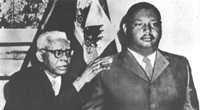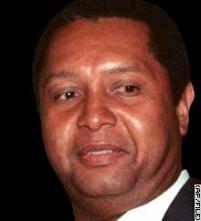Should We Care About the Return of Haiti’s Idiot Son, Jean-Claude Duvalier?
By Dady Chery
Haiti Chery
For the record, Haitians do not call François Duvalier “Papa Doc” or Jean-Claude Duvalier “Baby Doc.” Only foreigners do this. These endearments bring to mind the retorts: “Your papa… not mine,” and “Your baby… not mine,” though we smile politely and say nothing.
Haiti got its idiot son Jean-Claude Duvalier in 1972. He was never elected president: not even by a fraudulent count. He was inaugurated “President for Life” one year after the death of his father, François Duvalier.
This event was feted by the international community with the return of aid to Haiti after a decade’s hiatus. USAID, the World Bank, and the Inter-American Development Bank went on a shopping spree, and what they sought to buy with their “aid funds” was a transformation of Haiti’s economy, from an agricultural economy focused mainly on its domestic market, to an export economy.
Until then, Haiti had grown 100 percent of its food and been a country of small entrepreneurs producing sustainably for themselves and their communities.1
The aid funds were granted to wealthy Haitian landowners so that:
- Fertile lands would be switched from the production of foods for domestic consumption to the production of export crops mainly for the U.S. market.2
- Hard-working Haitians would be thwarted from entrepreneurial pursuits and converted to a low-cost labor force for assembly-plant (sweatshop) production.2
Between 1981 and the 1986 ousting of Jean-Claude Duvalier, over 20 percent of cultivated Haitian lands were switched over to export.3 In addition, the native Haitian pig that had served as a savings account for small farmers was eradicated.4 As predicted by USAID and the World Bank, Port-au-Prince became the destination for large numbers of famished peasants.
Migration from the rural areas to the capital city brought this 14-cents-per-hour labor force directly under the army’s control.
The USAID budget for Haiti rapidly grew, corporations paid no taxes, and Duvalier was celebrated by the international community even as he saved his cut of the worker’s wages in Swiss bank accounts and built an increasingly repressive apparatus.
When in 1985, Jean-Claude Duvalier granted himself the power to suspend the rights of any political party, the U.S. Ambassador commented that this was “an encouraging step forward.” The Reagan administration said that “democratic development” was progressing and offered Haiti more military aid.4
By 2010, Haiti’s food production for its domestic market had plummeted to a mere 40 percent,5 and Port-au-Prince’s population had tripled to over two million from its 1981 number of about 800,000.6 The earthquake of January 12, 2010 killed about 316,000 people, injured 300,000, and created over one million homeless.
Considering that more than two thirds of Port-au-Prince’s population6 came there as a result of foreign-aid policy, this implies that USAID, the World Bank, and IDB are responsible for over:
- 211,000 Haitian earthquake deaths
- 200,000 injuries
- 670,000 cases of homelessness.
There has been no word about reparation, only talk of more foreign aid.
The possibility that most of the damage to Haiti would follow Duvalier’s ouster from the country was far from mind when, on February 7, 1986, I popped open a bottle of champagne that I had kept chilled for the occasion.
As Duvalier and his wife were shipped to France on a U.S. Air Force jet, I toasted the popular revolt with a small group of university friends and acquaintances, one of whom, unbeknownst to me, was a member of the Haitian elite. When I wondered out loud whether there would be an attempt to force another strongman on the population, she assured us this would not happen.
“The model for ruling countries like Haiti has changed,”
she confidently announced.
“There will be no more Duvaliers or Somozas in Central America. The new model is to run countries like these with elected foreign-trained economists.”
She was right. The election of Jean-Bertrand Aristide in 1990 came as a shock. World Bank veteran Marc Bazin was the U.S.’s man and seemed assured of the presidency, but Aristide announced his candidacy only three days before the elections and won by a landslide. The U.S. learned from this mistake and revised its tactic.

Jean-Claude Duvalier, Michel Martelly, and Sophia Martelly greet each other on January 12, 2012, at an exclusive two-year commemoration of Haiti’s earthquake, while former US President William Clinton looks on.
Here is how the new system works in Haiti.
Months before the elections, popular candidates and their parties are banned from running. Even so, the elections serve merely as a distraction. The real player is the Prime Minister, who is not an elected official. He is appointed by the President but chosen by the international community.
Over the years, foreign concerns have foisted a succession of Prime Ministers on Haiti. Damage to the Haitian economy by these ministers have included a refusal to tax the heavily subsidized Arkansas rice that was used to flood the Haitian market so as to bankrupt the local rice farmers,7 the destruction of fertile agricultural lands between Haiti and the Dominican republic so as to build a free-trade zone, and the sale of numerous national industries, the most recent one being Haiti’s phone company.8
Haitian proverb: Moun sòt se levenman! (An idiot is an event!)
So what do we make of the January 16, 2011 return of Jean-Claude Duvalier to a U.S.-controlled airport in Haiti on an Air France plane? Not much.
Jean-Claude Duvalier is an idiot son who managed to fail as a dictator despite inheriting his father’s organization. He has failed even as thief and lost his remaining millions.9 The days of the strongmen are over.
Duvalier is a clown who came to distract the crowds during a costume change by the real players.

Former US President William Clinton and Jean-Claude Duvalier greet each other on January 12, 2012, at an exclusive two-year commemoration of the Haitian earthquake.
Those to watch are:
- Jean-Max Bellerive,10 who is formerly of the IMF and currently Haiti’s Prime Minister.
- Gabriel Verret11, who is formerly of USAID and currently Executive Director of Clinton’s CIRH (Commission Interimaire pour la Reconstruction d’Haiti),
- The UN force MINUSTAH whose introduction of cholera12 into the Artibonite River forced the migration of farmers from some of the most fertile lands in the country.
And if you really want to keep your eyes on the ball, don’t lose sight of former U.S. President William J. Clinton (Your Bill… not mine) and the Haitian elite that controls him. The Mevs family,13,14 for example, liberally lobbies U.S. politicians and has a keen interest in assembly work.
References
- Dady Chery. Aid as a Trojan Horse: On the First Anniversary of the Haitian Earthquake.
- Josh deWind & David H. Kinley III. “Export-Led” development. pp. 123-129. In: The Haiti Files – Decoding the Crisis, James Ridgeway, Editor. Essential Books, Washington D.C. 1994.
- Ibid. Noam Chomsky. The tragedy of Haiti., pp. 5-15.
- Ibid. Paul Farmer. Swine aid. pp. 130-133.
- Sak Vid Pa Kanpe: The impact of U.S. food aid on human rights in Haiti. New York School of Law Center for Human Rights and Global Justice, Partners in Health, RFK Center for Justice & Human Rights, Zanmi Lasante, 2010.
- Amanda Briney. Facts about Port-au-Prince, Haiti. About.com (2010).
- The Haiti Situation: An Interview With Jean-Bertrand Aristide pp. 27-29. Z-Magazine, Jan 2011.
- Hervé Jean Michel. Haiti’s state phone company finally privatized. Upside Down World. May 18, 2010.
- Baby Doc assets law set to enter into force. Swiss Info. Jan 17, 2011.
- Dennis Dames. Newly selected Haitian Prime Minister Jean-Max Bellerive vows to further Haiti’s pro-business stance. Bahamas Caribbean Blog International. Nov 11, 2009.
- Press release from the Interim Haiti Recovery Commission. Interim Haiti Recovery Commission announces over $1.b in new project proposals, outlines priorities. Aug 17, 2010.
- Dady Chery. Genocide in Haiti: carelessness or malice?
- The National Labor Committee. Sweatshop development. pp. 134-154. In: The Haiti Files – Decoding the Crisis, James Ridgeway, Editor. Essential Books, Washington D.C. 1994.
- Tracy Wilkinson. Haiti’s elite hold nation’s future in their hands. A few businessmen like Gregory Mevs will decide how — or whether — Haiti recovers from one of the worst natural catastrophes in modern times. Los Angeles Times. Jan 21, 2010.
UPDATE: Saturday, October 4, 2014. After more than three years of being treated like a VIP in Haiti by a new regime with Michel Martelly as President and Laurent Lamothe as Prime Minister, Jean-Claude Duvalier died of a heart attack at his home.
Source: Haiti Chery









Comments
Should We Care About the Return of Haiti’s Idiot Son, Jean-Claude Duvalier? — No Comments